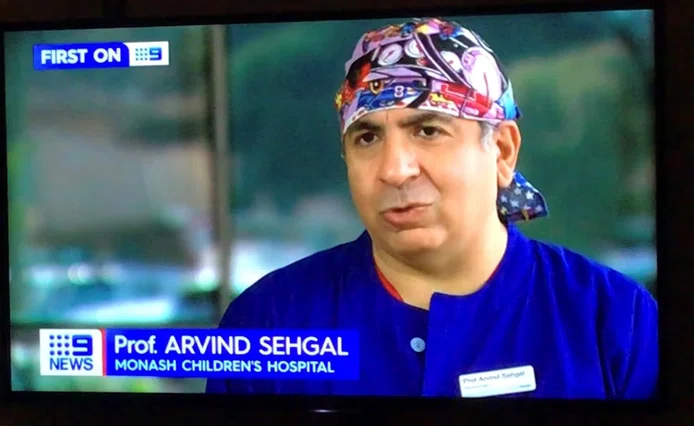


Recognising breakthrough neonatal and paediatric research
When asked “why did you get into medicine”, many doctors will respond that it was a desire to help others. That selflessness of wanting to improve patient outcomes and benefit the industry is one of the things which makes the profession so inspiring. It is what makes it even more rewarding to see RACP members recognised for their hard work and achievements. Professor Arvind Sehgal, a Neonatologist and Head of Cardiovascular Research at Monash Children’s Hospital, chose his profession after being inspired by his father, who was also a doctor. Professor Sehgal has been internationally recognised for his breakthrough neonatal and paediatric research.
Looking back at why he became a doctor, Professor Sehgal shares “My father wanted me to be an orthopod. He passed away when I was eight. I then lost my mum during first year medical school. Seeing illness and experiencing grief at close quarters, so early in life, inspired me to pursue medicine.”
Remarkably, Professor Sehgal turned this tragedy into something that would benefit others. “I opted for neonatology early in my career, as saving the life of a newborn adds so many more productive years to their lives. At times, my knowledge of bedside functional echocardiography has facilitated change in clinical management in critically unwell infants, to physiologically more appropriate interventions.”
As part of his training, Professor Sehgal completed a neonatal cardiology fellowship at University College Hospital in London and perinatal fellowship at The Hospital for Sick Children, which is affiliated with the University of Toronto. He then moved to Monash Children’s Hospital in 2007 and later completed a PhD in 2016, while working as a full-time intensivist.
“My current research focuses on cardiovascular adaptations in infants with severe bronchopulmonary dysplasia and those with fetal growth restriction,” says Professor Sehgal.
“I use my skills in cardiovascular ultrasound and vascular sonography to perform clinical research.
“Since 2012, I have almost exclusively focused on the cardiovascular effects of fetal growth restriction. About nine per cent term pregnancies and approximately a quarter of preterm deliveries are growth restricted (weigh <10th centile for gestation and sex); essentially affecting thousands of births each year.
“This is a public health issue as the cohort is at a significantly higher risk of developing adult-onset cardiovascular disease, hypertension, and death due to circulatory disorders. My research aims at unravelling the early impact of poor fetal growth during pregnancy, on the newborn heart and blood vessels. The aim is to have preventive strategies to pre-empt or ameliorate this effect, setting them on to a healthier cardiovascular trajectory,” says Professor Sehgal.
“The research found thickened and stiffer arteries in infants who were barely one to two weeks old. The arteries had properties similar to someone who would be 70 years of age. This early vascular ageing might explain the higher incidence of hypertension in these cohorts when they grow older.”
Professor Sehgal’s passion for research has been internationally recognised, as he was recently awarded the Australian and Aotearoa New Zealand Neonatal Network Emerge Respiratory Research Award. “Clinical research has immediate impact on diagnostics and therapeutics for my patient population. Being able to influence immediate outcomes with a short turnaround time from research to changing practice is extremely rewarding,” says Professor Sehgal.
Professor Sehgal shared the importance of collaboration in his work. “Thanks to great mentoring, research has been an integral part of my work since my formative years in paediatrics. I have over 125 international peer-reviewed publications.”
Professor Sehgal acknowledges others who have helped him with his breakthrough research, “None of the research would be possible without the collaborative efforts of medical-nursing staff at the NICU as well as the participation from infants and consenting parents.”
After achieving a lot throughout his career, Professor Sehgal took the time to pause and think about some of his professional highlights.
“I am exceedingly proud of three achievements. Firstly, I was able to complete my PhD in 2016 while continuing work as a fulltime intensivist. Secondly, I was invited by the American Academy of Pediatrics to lead a symposium on ‘Cardiovascular effects of fetal growth restriction’ in San Francisco in 2017. Lastly, I am proud of joining the Editorial Board of the Journal of Perinatology. This is the official journal of the section on neonatal-perinatal medicine, American Academy of Pediatrics, and the official publication of the National Perinatal Association of the United States.
However, with triumphs also come challenges. “My biggest challenge is time. Working as a fulltime consultant and some of the research being time-critical, meant coming into work over the weekends, or suddenly in the middle of the night. However, work, which benefits my patients, is always rewarding,” says Professor Sehgal.


